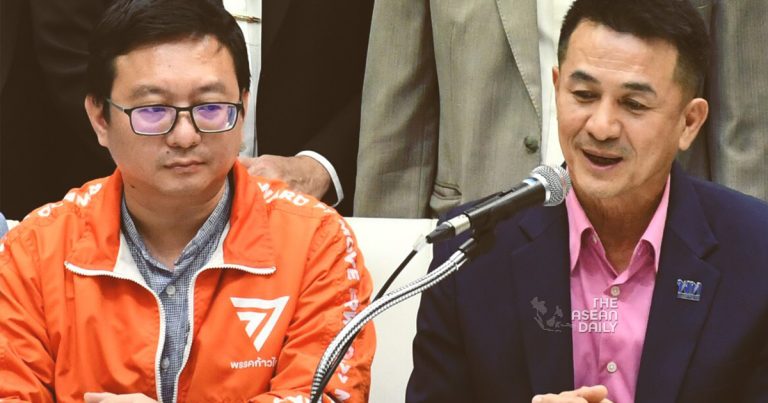30-7-2023 (BANGKOK) The Pheu Thai Party, which is leading the government formation in Thailand, is considering playing the loyalty card by inviting parties to form a new government only after they have voted for one of its candidates as prime minister, according to a source. The process of forming a new government in the country is becoming more complicated by the day, leaving Pheu Thai in a difficult position of either abandoning a friend or finding new alliances to work with. However, both options entail risks, prompting Pheu Thai to seek the least damaging way out politically.
The so-called pro-democracy supporters would pressure Pheu Thai if it abandoned the Move Forward Party (MFP) and the six other parties bound by the memorandum of understanding (MoU) they signed to establish the next coalition government together. The supporters have already staged protests against the senators who either voted against or abstained from voting for MFP leader Pita Limjaroenrat in his bid to become prime minister.
Efforts to form a government have hit a snag, with Pheu Thai finding itself in the eye of the storm. The MFP passed it the chance to form the government after its own efforts failed. Pheu Thai is aware that the Senate is likely to shun MFP again in any third round of voting.
The Pheu Thai Party, now the lead party assembling a government, can either stick with the seven other MoU-bound parties and keep the prospect of building a coalition line-up in limbo, or invite some parties from the opposing camp, currently commanding 188 MP seats, to join the new government and drop the MFP. However, parties from the so-called conservative camp have made it clear in talks with Pheu Thai that they will not be part of a government with MFP as long as it pursues an amendment to Section 112 of the Criminal Code, or the lese majeste law.
The Pheu Thai Party reckons one way to avoid the knife’s edge is to be seen not to be abandoning any party. Pheu Thai may move to nominate Srettha Thavisin, one of its three prime ministerial candidates, at the next round of voting for a prime minister, possibly after the long weekend later this week. Pheu Thai will be watching which other parties vote for Mr Srettha. Those that do will be extended an invitation to be included in the coalition government.
If any MoU-bound parties leave on their own accord, the Pheu Thai Party would save itself from criticism that it betrayed friends or trampled on pro-democracy interests. The situation surrounding the government’s formation remains fluid.
The next round of prime ministerial voting would be critical for the survival of the MoU that binds the parties. The MFP would be under heavy pressure as it must choose whether to put its Section 112 amendment policy on the back burner or see itself ejected from the coalition line-up and the Bhumjaithai Party brought in in its place. The Pheu Thai Party stands to lose its credibility if it abandons the MFP, although it might risk it in order to secure a safe and secure return for former Thaksin Shinawatra from self-imposed exile abroad.




